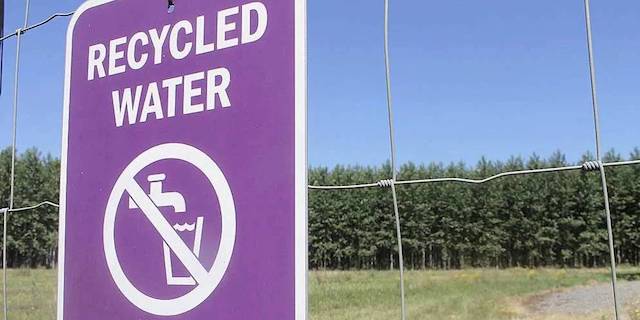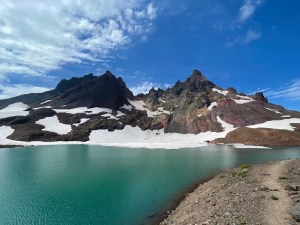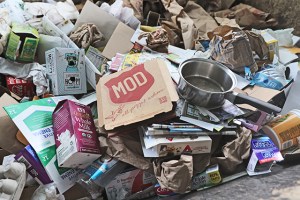Oregon lawmakers invest in expanded water recycling for irrigation
Published 4:05 pm Thursday, June 19, 2025

- HB 2169 will expand water recycling projects in Oregon by providing money to hire an interagency team leader to facilitate such projects. (Capital Press file photo)
Lawmakers are investing nearly $300,000 to expand water recycling in Oregon by hiring an interagency team leader charged with overcoming regulatory barriers to reuse projects.
Even if it’s clean enough to drink, treated wastewater is often flushed directly into rivers instead of being used for irrigation due to bureaucratic and logistical hurdles.
House Bill 2169 intends to make water recycling a higher priority for state agencies, building upon recent work by Oregon environmental regulators to dismantle or reduce obstacles created by government requirements.
Trending
“It’s a continuation of a project that has begun, that has momentum,” said Susie Smith, a representative of the Oregon Association of Clean Water Agencies.
The proposal was approved on June 19 by the Senate, 28-1, after previously passing the House unanimously. The bill must still be signed by Gov. Tina Kotek to become law.
“I don’t want to quite call it low-hanging fruit, but it’s an opportunity Oregon has been slow to explore,” said Sen. Jeff Golden, D-Ashland.
Sen. Noah Robinson, R-Cave Junction, was the sole member of the Senate to oppose the bill — not because he is against water recycling, but because he believes the state’s Department of Environmental Quality is “out of control.”
“I simply don’t trust them to carry out this program in a responsible manner,” Robinson said.
Much of the bill lays out further steps the DEQ must take to improve policies and operations for recycling water, such as creating an interagency team with agriculture, wildlife and health regulators focused on the issue.
Trending
The interagency team would try to resolve conflicts among agencies that can hinder water recycling projects, provide technical assistance to local governments and educate and train government employees on water reuse benefits, among other tasks.
While the original version of HB 2169 was dedicated solely to policy considerations, the budget-setting Joint Committee on Ways and Means recently added a provision dedicating $295,000 to hiring a full-time “natural resource specialist” who’d lead the interagency water recycling team.
The committee is often known for killing or reducing spending provisions, but in this case, the decision to add the funding was supported by all its members except for Sen. Dick Anderson, R-Lincoln City, who said he was concerned about DEQ’s workload.
“I know they are too busy and I don’t want to give them any more work,” he said.
Another committee member, Rep. Vikki Breese Iverson, R-Prineville, voted in favor of HB 2169 despite expressing reservations about directing more money to government officials who she believes have trouble performing their core functions.
“And we’re giving them a new program, and that’s bothersome,” she said.
Susie Smith, representative of the Oregon Association of Clean Water Agencies, responded that lawmakers have already dedicated funds to expanding water recycling in Oregon since the 2023 legislative session.
“We are working to complete and not lose that investment,” she said.
The significance of HB 2169 is that it would formally designate an interagency team to pursue water recycling, which is intended to enforce a more unified approach among state agencies to cooperate with DEQ on the issue, Smith said.
“There hasn’t been an accountability for the other agencies to be responsive and for the DEQ to move forward with the inquiries, the evaluations,” she said.
Breese Iverson said she understands the intent of the bill but thinks it’s unfortunate that lawmakers must compel state agencies to formally interact instead of relying on a more informal approach.
“I’m sad we have to do this in this kind of setting — that our agencies can’t just talk and work,” she said.
The effort to modernize Oregon’s water recycling regulations responds to criticisms by wastewater treatment utilities who said existing rules are outdated and overly complex.
Treated wastewater that can legally be released into rivers generally isn’t used for irrigation because potential users often fear the regulatory scrutiny and uncertainty associated with such projects, experts say.
For example, reused water must be extensively tracked under current regulations to ensure it doesn’t have unintended consequences, such as raising the temperature of a smaller waterway than it’s intended to enter.
The goal of HB 2169 and previous legislation is to encourage environmental regulators to simplify these requirements while still maintaining water quality protections, potentially by studying how other state governments have addressed the problem.
During an early legislative hearing on the bill, Rep. Ken Helm, D-Beaverton, said that ordinary people often “shake their heads and don’t understand” why water that’s clean enough to release into waterways can’t be used to irrigate crops — particularly as water supplies grow more constrained.
“This is a government inefficiency we should fix,” he said.








